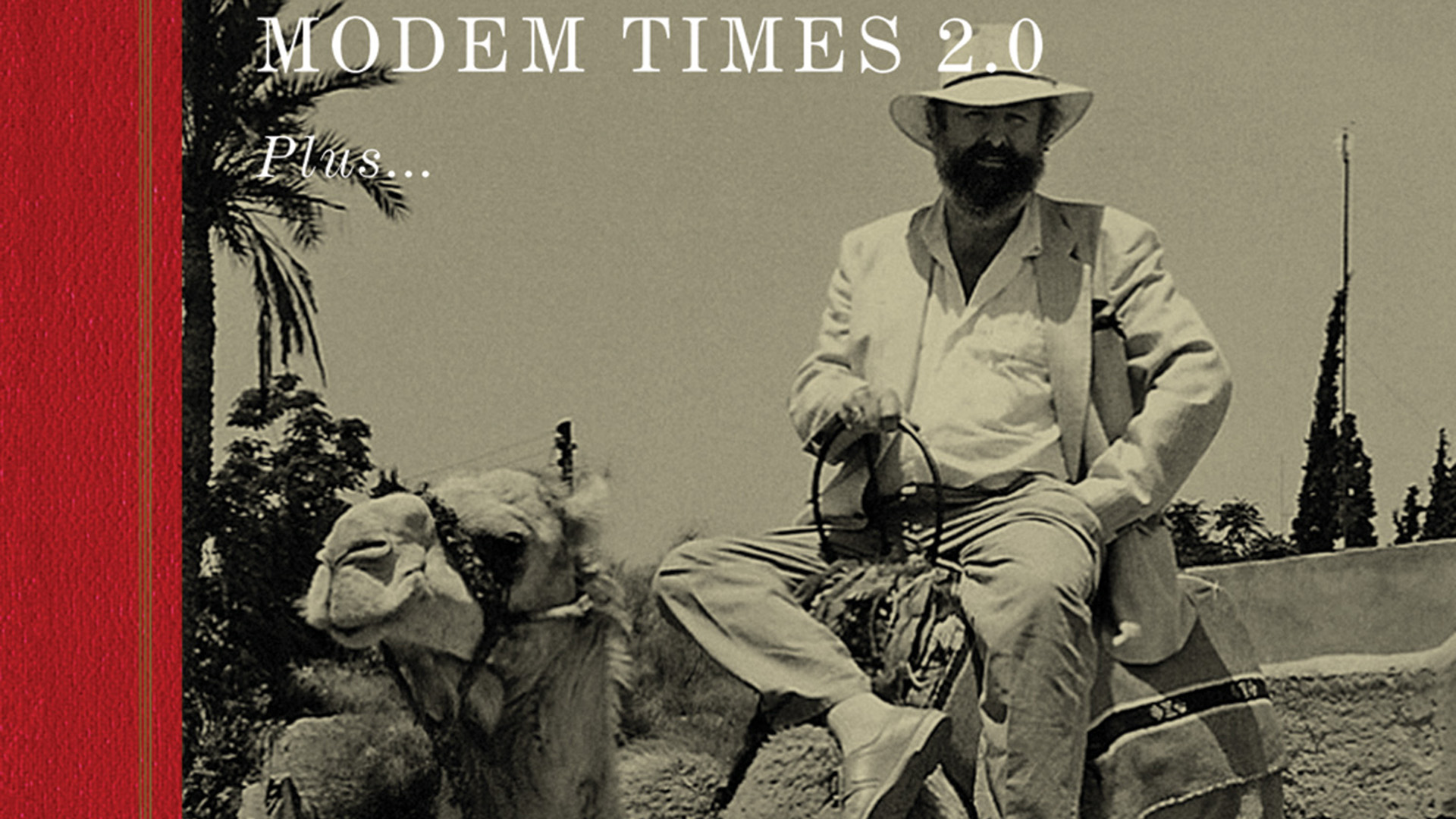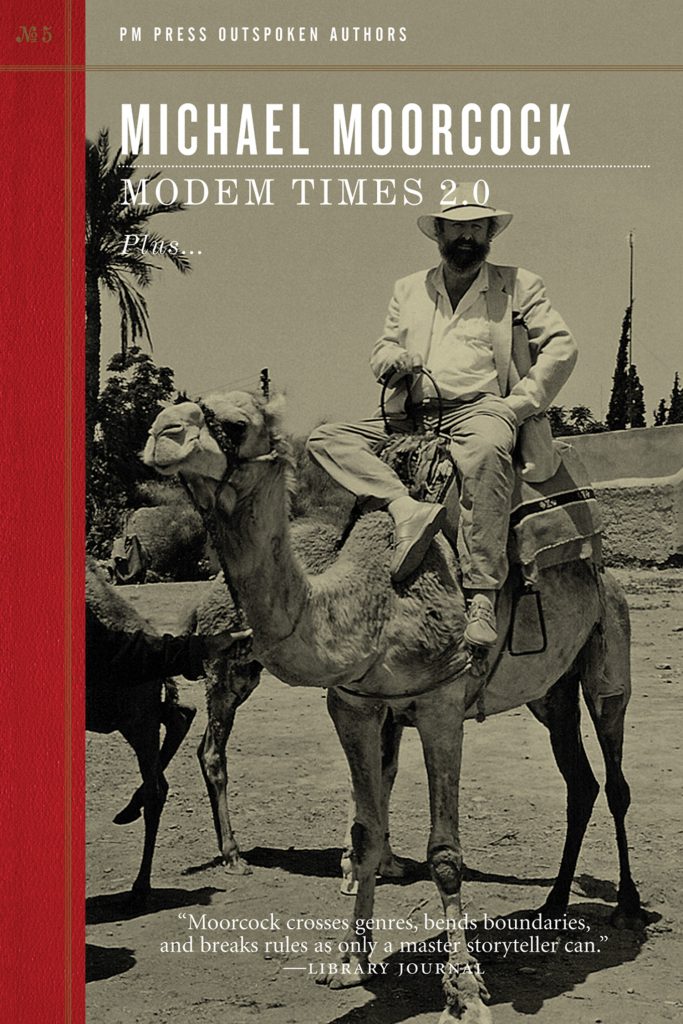By Joe Gross
The Statesman
April 3, 2011
It’s fitting that Michael Moorcock’s house seems to exist in four dimensions and is weirdly tough to get to.
First, GoogleMaps completely blows the directions to Bastrop, failing to mention an overpass.
Then,
the entrance to Moorcock’s house bears a perpendicular relationship to
the street address, the result of an L-shaped lot that dates to when the
legendary English writer bought the house in 1994 with his American
wife, Linda Steele.
Partially because it’s confusing and
partially because I’m an idiot, I practically circle the place before I
find the door. The cat does not look too impressed.
It’s fitting
because Moorcock, 71, is one of the preeminent fantasists of his age,
having given the world everything from the iconic anti-hero Elric to the
immortal/immoral anarcho-terrorist Jerry Cornelius, to the wretched and
completely unreliable Col. Pyat.
As the editor of the English literary magazine New Worlds,
Moorcock midwifed science fiction’s transition between the Golden Age
and the new wave, making a home for such avant-garde writers as J.G.
Ballard, Thomas Disch and Norman Spinrad.
It’s impossible to
imagine generations of writers without Moorcock, from Alan Moore to Neil
Gaiman to China Mieville. (Heck, it’s impossible to imagine something
like Dungeons and Dragons without Moorcock’s Eternal Champion books.)
He made records with Hawkwind and won acclaim for such mainstream novels as Mother London, which was shortlisted for the Whitbread Prize. A 2010 anthology of his nonfiction, Into the Media Web, spans fifty years, 300,000 words and 720 pages, and weighs 4.5 pounds.
Look
on his works, ye mighty, and, well, at least be a bit intimidated at
his productivity and his imagination. It really is something else.
But if you have no idea who the man is, his most recent book is not a bad introduction.
Modem Times 2.0
is an entry in PM Press’ “Outspoken Authors” series and comprises an
appropriately baffling and non-linear Jerry Cornelius short story
(slightly revised from a story published in 2008); the essay “My
Londons,” a clear-eyed reflection on Moorcock’s life in that most iconic
of cities; and an interview with Moorcock conducted by series editor
Terry Bisson. (You might know Bisson from his excellent
alternate-history novel Fire on the Mountain; if you don’t, you should.) PM Press also is slated to reissue Moorcock’s Pyat Quartet starting in March 2012.
Cornelius
isn’t Moorcock’s most famous character, but perhaps he is the most
flexible, which is saying something for a writer famous for leaving
himself an awful lot of room for multiple meanings (or no meaning at
all).
The blurring of high and low art, and a mix of science
fiction, fantasy and avant-garde literature, has been a through-line in
Moorcock’s singular career.
“The Cornelius stuff wasn’t published
as sci-fi in England,” Moorcock says. “One of the frustrating things
about America for me is the tendency to isolate anything that has any
pretensions to address a grown-up audience and start slotting it into a
special category, like calling an English TV version of ‘I, Claudius,’
‘Masterpiece Theatre.’ There’s a division between, let’s call them,
intellectuals and the public in this country that is so much greater
than it is in Europe. It’s much harder to find an ordinary, common
cultural level.”
Is Cornelius a hipper-than-thou secret agent,
indulging in every vice? Is he an adolescent fantasy? All of this and
more. Cornelius is where Moorcock’s head goes when events warrant.
“If
things in the world get too painful, I start to automatically default
into Jerry Cornelius,” Moorcock says. “For example, I’m writing a
Cornelius story right now that has to do with the various uprisings in
the Middle East, but it’s not set there, which is pretty typical for
that character. I try to find angles of attack that aren’t the normal
angles. He’s less a character than a literary device.”
Well,
that’s certainly true. The Cornelius books are less sci-fi than
experimental fiction—more in the tradition of Thomas Pynchon or William
S. Burroughs than, say, Isaac Asimov. Often made up of seemingly
disconnected paragraphs, they work as much by juxtaposition as anything
else.
“I don’t like to deal with the event head-on,” Moorcock
says. “If you don’t, it perhaps broadens the subject. Sometimes it
doesn’t work—this is an on-going experiment—but when it works, a
Cornelius story should be able to give a few different angles on world
events.”
Right now, Moorcock is enmeshed in The Whispering Swarm, the first book in the planned “Sanctuary of the White Friar” trilogy.
“I’m
not sure if I really should be working on trilogies at my age,”
Moorcock laughs, “but this one is essentially an autobiographical novel
with a very heavy fantasy element.”
Whispering Swarm is
about London, but a London with a key difference. “There was a part of
London called Alsatia that was a sanctuary for those who had broken the
law,” Moorcock says. Located between the River Thames and Fleet Street,
and including the Whitefriars monastery, Alsatia held the sanctuary
privilege (and a certain measure of lawlessness) for centuries before
being dissolved by Parliament in 1697.
It’s an extremely
attractive idea, and Moorcock imagines it has continued to the present.
But he adds that the book is autobiography, mostly. “I’m trying to look
at the ways I used escapism at crucial moments in my life, my two
previous marriages, for example,” he said. “Whether I used escape routes
and how I used them.”
There isn’t a publication date yet — “It
isn’t scheduled because I’m only a third of the way through the bastard”
— but may he live to finish it and a dozen more, on this Earth and
others.







